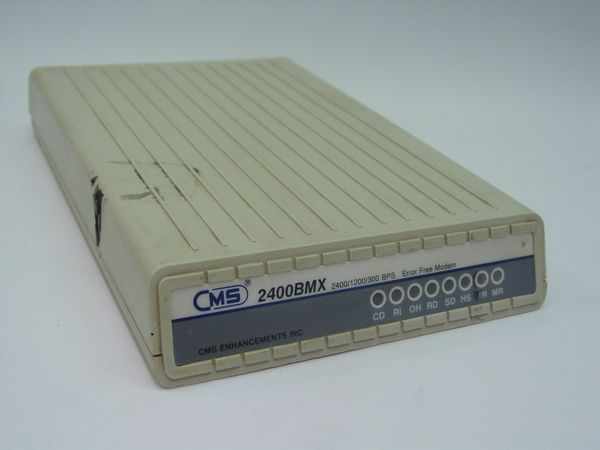Before the days of high-speed internet and even dial-up AOL, there was an "online" world of communication that many people today have no idea existed. A much more decentralized way of communicating "online" that could be argued to have significantly helped speed up the use and acceptance of what we know as the internet today.
What I am speaking of is the Bulletin Board System (BBS).
A BBS is a computer running software enabling users to connect to the system through the use of a terminal program. Once a user connects to the system and logs in, they  can perform various functions such as exchanging messages, transferring files, reading news, direct chat, and playing text based games. In order to access a BBS you originally needed a phone line using a modem. If you were using a modem back in the late 1980's and early/mid 1990's, I am sure you remember the obnoxious sounds it would make when connecting with another system. Those obnoxious sounds were the modulation and demodulation which acted as a virtual Rosetta Stone between the various incompatible microcomputers, allowing them to "speak" to each other, successfully transferring data.
can perform various functions such as exchanging messages, transferring files, reading news, direct chat, and playing text based games. In order to access a BBS you originally needed a phone line using a modem. If you were using a modem back in the late 1980's and early/mid 1990's, I am sure you remember the obnoxious sounds it would make when connecting with another system. Those obnoxious sounds were the modulation and demodulation which acted as a virtual Rosetta Stone between the various incompatible microcomputers, allowing them to "speak" to each other, successfully transferring data.
The American ingenuity that created the first ever BBS came out of Chicago, IL in the late 1960's. A man by the name of Ward Christensen awoke on January 16th, 1968 to

find himself snowed in and unable to travel to work. Instead of relaxing the day away he decided to call his friend Randy Suess. During their conversation they came up with the idea to create a computer system with software that would allow members of their Chicago computer club (CACHE) to dial-up via modem to the system and submit articles for their monthly newsletter. Ward Christensen coined the term "Bulletin Board System". Ward decided to develop the hardware while Randy worked on the software. After one month of hard work during their off time, the first ever BBS went live on February 16th, 1968. It was called "CBBS" - Computerized Bulletin Board System.
Ward and Randy actively gave away their CBBS software for free and new BBSs began popping up around the USA, such as "CBBS-NW". Computer hobbyists were so excited that they had discovered a way to connect to another person's computer system and communicate with individuals of like mind. Most BBS's were run by hobbyists and were provided as a free service. Some BBS's charged users a subscription fee for initial access or for additional daily access time. The size of the BBS was determined in large part by the amount of phone lines and modems an operator had. If a BBS system operator (or "SysOp") only had one phone line and modem, then only one user could be dialed in "online" at one time.
For nearly 20 years BBSs were the main way to communicate with individuals "online". At their (BBS's) peak, there were over 150,000 in North America. However, as the internet became more popular in the mid-1990's many of the companies running large BBS's began reinventing themselves as Internet Service Providers (ISP's). Even the most popular BBS magazine "BoardWatch" changed it's name to "ISP Watch". As the internet grew in popularity, the BBS's faded quickly out of the picture. 150,000 BBS's quickly dwindled to thousands and by the mid-2000's faded to only a few hundred. Once the internet became the dominant form of communication "online", many of the BBS's that stayed online made their services available via the internet using Telnet in addition to connecting via dial-up modem.
Why am I writing about what may seem to be an outdated communications technology? How much longer will we have the internet as we know it today? Anyone who keeps up with current events through independent media can clearly see the State continue their  policy of incrementalism with the internet and freedom of expression. The ideas of liberty are spreading like fire in the minds of men (and women) thanks to the communications technology that makes up the internet. This fact has the State and the ruling class worried. This is especially apparent in the continuous government propaganda stories of "cyber-security threats" (i.e. Stuxnet, Anonymous, so called "piracy"...etc) and the resulting "solution" of said threats as State legislation. Never forget that the power to regulate is the power to grant favors.
policy of incrementalism with the internet and freedom of expression. The ideas of liberty are spreading like fire in the minds of men (and women) thanks to the communications technology that makes up the internet. This fact has the State and the ruling class worried. This is especially apparent in the continuous government propaganda stories of "cyber-security threats" (i.e. Stuxnet, Anonymous, so called "piracy"...etc) and the resulting "solution" of said threats as State legislation. Never forget that the power to regulate is the power to grant favors.
While I have the utmost confidence in the uber-techies that are always a few steps ahead of any type of State control scheme, it never hurts to have a back up plan. As I  explained above, BBS technology worked for 20+ years as the dominant form of "online" individual communication. BBS's work in a decentralized and individualistic fashion. To have various BBS's across America as repositories of liberty/voluntaryist/individualism/critical thinking content made accessible via both the internet and old school dial-up would be a good idea in today's political climate. The computer power required to run such systems is minimal and inexpensive. The more means we have to communicate the ideas of liberty the better because as Ernie Hancock says, the revolution is between the ears.
explained above, BBS technology worked for 20+ years as the dominant form of "online" individual communication. BBS's work in a decentralized and individualistic fashion. To have various BBS's across America as repositories of liberty/voluntaryist/individualism/critical thinking content made accessible via both the internet and old school dial-up would be a good idea in today's political climate. The computer power required to run such systems is minimal and inexpensive. The more means we have to communicate the ideas of liberty the better because as Ernie Hancock says, the revolution is between the ears.
If you would like to learn more about Bulletin Board Systems and how to create your own be sure to check out the following websites:
BBS: The Documentary - http://www.bbsdocumentary.com/
List of BBS Software - http://en.wikipedia.org/wiki/List_of_BBS_software
The BBS Corner - http://www.bbscorner.com/
Cody Hall is an independent blogger whose work can be found at his website www.Voluntarymind.com Email iambinarymind@voluntarymind.com

